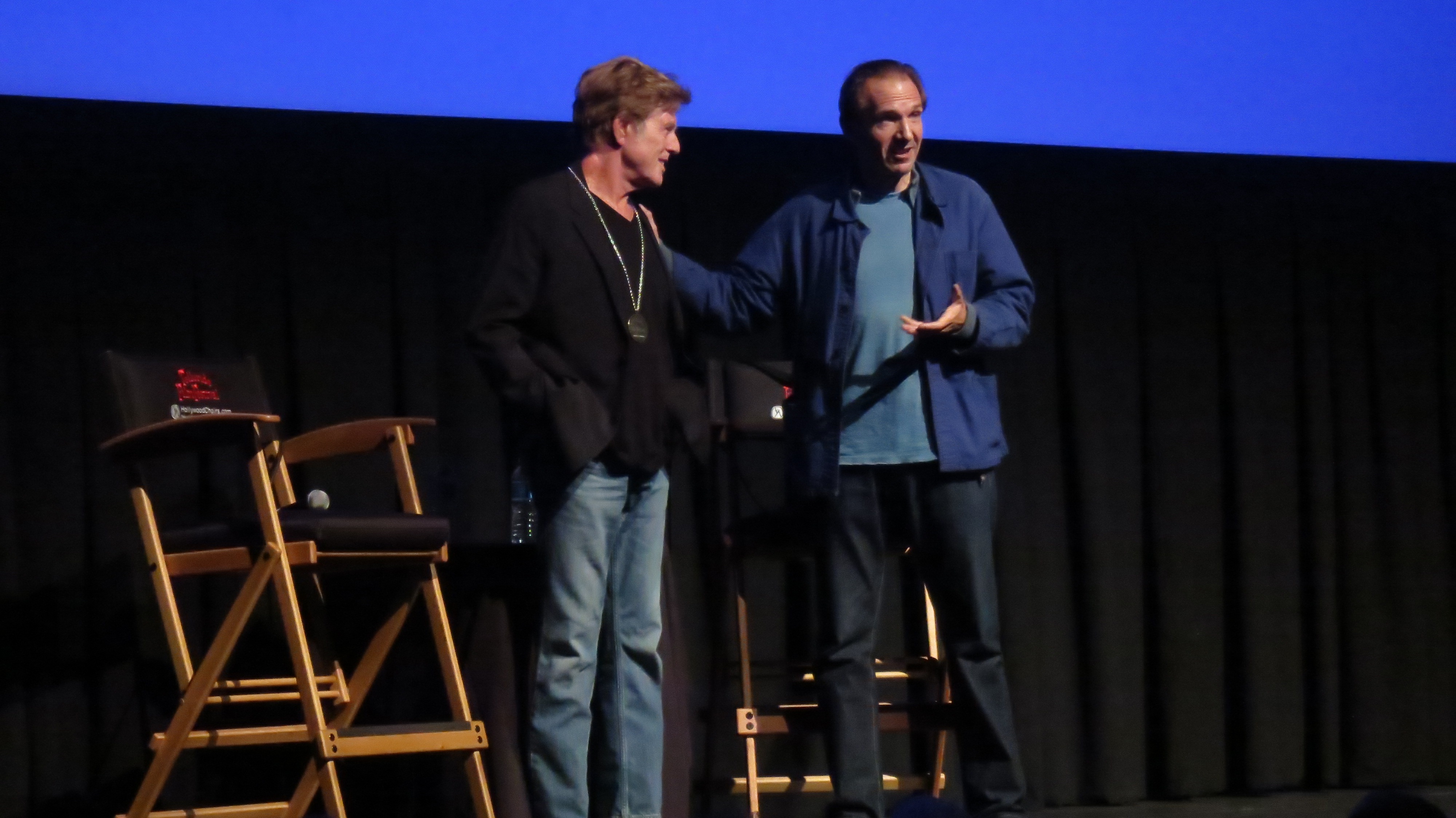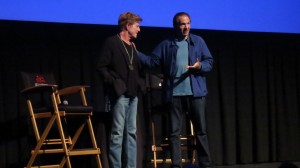
03 Sep Telluride Film Festival: All Is Lost + Gravity
“It’s ironic: after creating Sundance (1980) no one asked ME to be in a film…” “I love the detail work around every moment of the film (All Is Lost) and physically losing myself in the character when the only thing left for him to do was to continue…” “I love to keep moving forward… to try new things. It just feels good.” Robert Redford, 2013 Telluride Film Festival Tributee

Robert Redford, Ralph Fiennes, interviewer
There was a lot of talk, some negative, about J.C. Chandor’s “All Is Lost” in the waiting lines at the 2013 Telluride Film Festival. I felt I needed to add some comments of my own, which have turned into a bit of a review of this film as well as a little about “Gravity” and “Nebraska.” How are they linked?
To answer, I need to give a very brief summary of my own life: I grew up in farm and ranch country on the dry side of Washington State. I was a fighter pilot with the US Marine Corps; was passed over for the astronaut program in the early 1960s (they were looking for scientists, not liberal arts graduates); spent over 33 years flying for Northwest Airlines; between marriages lived on a small ocean-going sailboat, with numerous lengthy solo passages, and a few “interesting adventures.” This is not to say I have the last word on these movies, just to show I do have a certain perspective.
“All Is Lost” was our first movie of the 2013 Telluride Film Festival, and our first presentation at the stunning new 650-seat Werner Herzog Theater with its beautiful sound and projection systems. From start to finish I loved this movie. Having as known and respected an actor as Robert Redford play a solo role with no dialogue in a 1 3/4 hour film was a brave choice. Among the criticisms I heard in the hours and days after the screening were: “Why should I care about this character? There’s no back story. I could understand why he’s out there if he were sailing to cure cancer or something.” “Another disater? Life doesn’t work that way. This was too artificial.”
My replies to these questions remain true. In my mind, the exact reason this man is sailing alone is immaterial. I suspect that most men and a not-insignificant number of women, at some point in their lives have considered going to sea. And many of us have done it.
Chandor has envisioned a complete story and Redford has portrayed the story with his no-decorations acting. “All Is Lost” proceeds from an idylic sail in the Indian Ocean, one of the loneliest, emptiest pieces of water on this planet, through an intense storm and its aftermath. There are several clues that solo sailing is a somewhat recent way of life for the protagonist: with his electronic navigation inoperative he opens a text book on celestial navigation, studies the obviously unfamiliar sextant. When it comes time to abandon ship, he is not sure what all his life raft package contains. This is not to say Redford’s character is unprepared; he is simply of a new generation of long-distance sailors who have come to rely on the usually dependable electronic tools. Not only is there no clear back-story, we don’t even learn the sailor’s name. Those are just details. The story tells itself.
Another complaint was about the sailor’s taking time out to shave with disaster all around him. I can only say that when I learned from a concerned freighter that “my” hurricane was headed for me my reaction was to cook myself a good meal, thoroughly clean the cabin of my 28′ Shannon cutter, then go to bed and get some sleep. When the storm hit (Floyd had been downgraded to a tropical storm by that time- couldn’t have proved it by me) it spent 12 hours just getting wilder, darker, louder; when the rogue wave struck us, my boat rolled and I was ejected over the starboard rail, thinking out loud, “Glad I just put on my safety harness!” Then I was under the boat, it was upside down, and I was worried about being trapped there.
Sometime later I was back aboard, pumping water with my one remaining bilge pump handle, with no recollection of how that had happened. I saw the self steering vane’s stainless steel mast was bent double, worthless, and the dodger that protects the companionway was wiped clean off the boat. Everything down below was wet, water covered the cabin sole, my long-range radio was soaked with salt water and worthless.
I had nearly 400 nautical miles to hand-steer to my destination in the Bahamas. I saw one ship in the next several days, a Spanish-registered freighter I was able to reach on my VHF radio. He said he would relay the word that I was OK to the US Coast Guard. That never happened. Watching “All Is Lost” on Thursday afternoon took me back to those dangerous hours. Don’t tell me the movie wasn’t realistic. The only thing I can add is that when things go wrong at sea (or in aviation, for that matter) they go wrong in bunches. That is reality. J.C. Chandor has made a REAL movie. Authenticity. Robert Redford’s portrayal of a man who just goes on doing and fixing as it becomes apparent that all is lost, is authentic. The excellent cinematography make it all the more real. I sat transfixed throughout this movie. Though it is frighteningly real, the raw beauty of “All Is Lost” drew me in. The desire to go back to sea was there, just as it was once I had my boat put back together in 1987. That trip eventually ended back in the Caribbean, and two years later Susan and I sailed from St. Maarten to Bermuda to get married. Robert Redford’s character? According Chandor, you have to decide for yourself. Or accept that the outcome is a mystery.
Speaking of things going wrong in bunches, we also saw “Gravity” at the Werner Herzog. “Gravity” made great use of the wonderful Meyer Sound system and the sharp 3-D capability at this newest TFF venue.
Alfonso Cuaron and his son Jonas have imagined, then gone to great effort to create a movie about the dangers of limitless space, the loneliness of two survivors of a tragic event, the fear (it must be universal) of dying in such a vast place.
“Gravity” is edge-of-the-seat suspenseful from beginning to end and should get Oscar nods for its use of film-making technology. I do have a few quibbles about the physics of the movie at times. The most prominent example is the scene in which Sandra Bullock fires the landing rockets of the Soyuz to catch up with the Chinese space station to use its re-entry vehicle to return to Earth – without the use of a computer. This doesn’t seem quite authentic to me, but I’m just a liberal arts graduate.
The movie is so well-made and stunning visually that these minor quibbles in no way detract from the power of “Gravity.”
Telluride Inside… and Out is reviewing “Nebraska” elsewhere but I did want to add a few words about the authenticity of the movie from my perspective. I mentioned at the beginning of this piece that I grew up in a ranching family. The men in my family still speak as though they have to pay by the word. The laconic denizens of “Nebraska” who never speak in whole sentences were instantly familiar. Authenticity. Alexander Payne’s unerring ear for the rhythms of speech, his eye for seeing the beauty of the stark landscape, these elements along with the right-on acting by both pros and recruited locals in the cast, resulted in a sense of authenticity. I also loved the beautiful black-and-white cinematography. I’m going to say the word again: Authenticity. Do you see a theme here?


Sorry, the comment form is closed at this time.